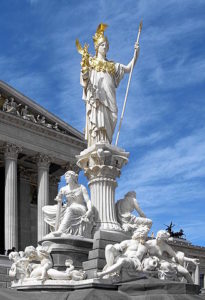ISRAEL: DEMOCRACY FATIGUED, OR ALIVE AND KICKING?
By: Prof. Julien Bauer

The Western States are both democratic and wealthy: they have won the Cold War and are, compared to other States, a success. Nevertheless, many of these states, in particular, the Western European ones, are engaged in a campaign of self-vilification, blaming themselves for all the problems of the world (demographic, economic, social, environmental) and finding excuses for the excesses of other regimes.
A recent Globe and Mail article (The threat of democratic fatigue in Israel is real – around its election, and its choices around the U.S. and China, Toronto, January 2, 2020) by Dominique Moisi, French political scientist and writer, special adviser at Institut Montaigne in Paris – presents a supposedly dysfunctional democratic system in Israel tempted to follow the “Chinese model”. That having three elections in less than a year creates political fatigue is obvious. But that this is a product of a conflict between two totally different political viewpoints within Israel, as Moisi holds, makes no sense.
Israelis are, in fact, remarkably united in the conviction that Iran poses an existential threat. Moisi writes about the “supposed [my italics] threat of a new Holocaust from a nuclearized Iran”. In fact, Iran repeatedly and publicly declares that Israel “must and will disappear”, that “Iran will destroy Israel”. Still, while Iran repeatedly and explicitly advocates the annihilation of a State, the response from the UN and world democracies is a deafening silence.
The European Union even established an economic entity to weaken US economic sanctions against Iran, after the Americans’ abrogation of the JCPOA nuclear agreement. Doing this, while asserting that Iran is just “supposed” to prepare the destruction of Israel, as EU policy does, is beyond gullibility.
Israel has, and will continue to sign economic and technological agreements with China–not to do what many other states have done would be counterproductive. According to Moisi, this is dangerous for (Israeli) democracy. Further, this policy is somehow caused by the unpredictability of President Trump. Unpredictable in some regards he may well be, but in relation to Israel he has followed a clear political program. Moving the US embassy to Jerusalem, recognizing Israeli sovereignty on the Golan Heights and the right to build villages and small towns in the West Bank, seems quite predictable.
Further, to put Presidents Truman and Carter in the same basket, as Moisi does, is strange. The first recognized Israel, the second spent his political life blaming Israel. The US, like the Western world generally, is a largely Christian society. But it, and the Europeans, have something in common with Muslim states: an obsession with Judaism, Jews, and Israel, perhaps because Judaism, which preceded their religions, didn’t disappear, but re-established its own state in its own land.
Southeast Asia, China, India, and other countries have no link with Judaism, and no history of antisemitism, and, therefore, may be favorable or unfavorable to Israel without carrying any theological baggage. Both China, an authoritarian State, and India, a democratic one, were previously hostile to Israel for political-ideological reasons, but at least a quarter of a century ago now, they changed their policy and established friendly relations with it. This had to do not with anti-Semitism, but with perceptions of their own national interests.
Chinese internal policy is a reprehensible one. This does not prevent Western democracies from maintaining political relations and economic exchanges with it. To blame the US and Israel for moving in the direction of illiberal democracy, as Moisi does, because of their respective China policies, is a gratuitous insult. Is Europe the only liberal democracy? Do not the European states also have relations with China, and with Muslim and other dictatorships? To say the U.S, and Israel policies towards China would prevent a “geography of values” is a contradiction. If the US and Israel are moving along the same path, how can this lead to a weakening of shared values between them?
In summary, the article is confused, but has a clear (and disturbing) message: beware of too much democracy, especially in Israel, and beware of the influence of non-democratic China, only on Israel, but not on other democracies. With such an approach, is it a surprise that European Union policy and punditry are in such a state of disarray?
(Julien Bauer, Doctorate in Political Science from the Sorbonne, a retired Professor of Political Science at the Université du Québec à Montréal, is a CIJR Academic Fellow.)

